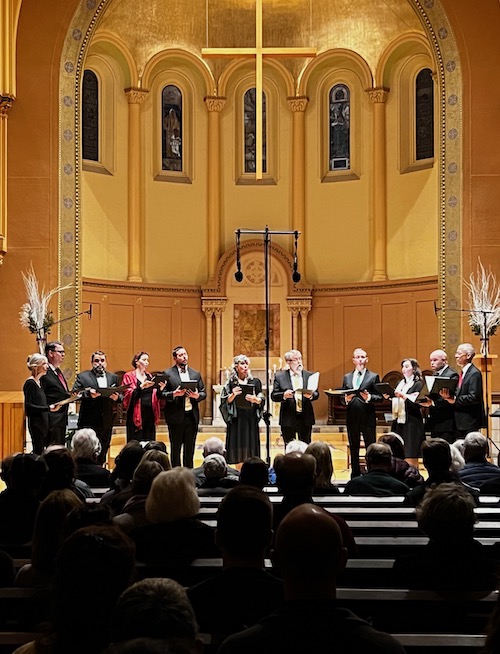Blue Heron revives Medieval English Christmas in a fresh and bracing fashion

Blue Heron performed “Christmas in Medieval England” Friday night at First Church in Cambridge. Photo: BH
“Christmas in Medieval England,” Blue Heron’s much-loved holiday offering, is back. After a six-year absence, artistic director Scott Metcalfe unveiled a new version of the program at First Church in Cambridge on Friday night.
The evening offered a type of liturgical overview of the season. Beginning with Advent and proceeding to Christmas Day by way of the Annunciation and Christmas Eve, its fare spanned the 13th– through the 15th-centuries, with a strong emphasis on music from the latter.
For stylistic variety alone, the night’s selections were bracing.
Leonel Power’s “Gloria,” caught the ear with lurching, Machaut-like harmonic turns as well as episodes of vigorous imitative counterpoint. The same composer’s antiphon “Ibo michi ad montem mirre” offered a somewhat more subdued view and was sung with dusky warmth by Kim Leeds, Jason McStoots, and Sumner Thompson.
Another antiphon—“Alma redemptoris mater”—stood out for its timbral richness, Leeds, Clare McNamara, and Sophie Michaux blending their voices with radiant warmth. The same group impressed with their snapping, shapely rendition of “Nowel! Owt of your slepe aryse” and, again, in the haunting, beautifully matched “Lolay lolay.”
The men of Blue Heron brought similar purity and tonal synthesis to bear on their items, opening the concert from the front of First Church’s darkened sanctuary with a distinguished account of the carol “Veni, veni Emanuel.”
Later on, “Veni, redemptor gencium” emerged boldly, its weighty drones anchoring the ensemble’s eminently secure projection of its flowing melodic lines. A similar strength of character also marked the night’s performances of “Dominus dixit ad me” and the plangent “Ave rex angelorum.”
The rest of the evening’s offerings involved some blend of mixed voices or voices with instrumental accompaniment.
Metcalfe, playing the harp, joined Leeds, McNamara, and Michael Barrett for a bright, graceful take on the lilting pairing of “Angelus ad virginem” and “Gabriel, fram Heven-King.” He was also on hand to accompany McNamara’s lilting solos in “Ave Maria I say” and Thompson’s energetic traversal of “Thys yol the beste red that y kan.”
Harpist and a vocal sextet tripped fetchingly through “Hayl Mary, ful of grace,” drawing out its gently biting dissonances along the way. Meanwhile, Metcalfe and a trio consisting of Michaux, Corey Hart, and Barrett warmly drew out the peculiar text settings of “Ther is no rose of swytch vertu.”
In “Auxce bon youre delabonestren” and the codas to “Ave Maria I say” and “Thys yol,” Laura Jeppesen and Charles Weaver joined Metcalfe to from a combo of, respectively, rebec (a gourd-like relative of the violin), lute, and harp. Though the rebec was out-of-balance with the other instruments, the trio imbued each work with limber style.
Otherwise, the evening’s numbers built in size, grandeur, and color as the concert moved towards its Christmas Day denouement.
Blue Heron’s account of Pycard’s “Gloria” was dispatched with dancing energy and shapely dynamics. As was an anonymous English “Sanctus,” whose flowing melismas and involved counterpoint were rendered with admirable textural clarity.
An impellent sense of direction marked both the “Agnus dei” from the Missa Veterem hominem—each of its phrases built to a nobly ringing peroration—and the ensemble’s lusty reading of “Nowel syng we bothe al and som.” The last brought a welcome dose of fun and festivity to the night, as did the concert’s closing number, a knowing, playful run-through of “Nova, nova! Ave fit ex Eva.”
The program will be repeated at 3 p.m. and 8 p.m. Saturday at First Church in Cambridge. blueheron.org
Posted in Performances

